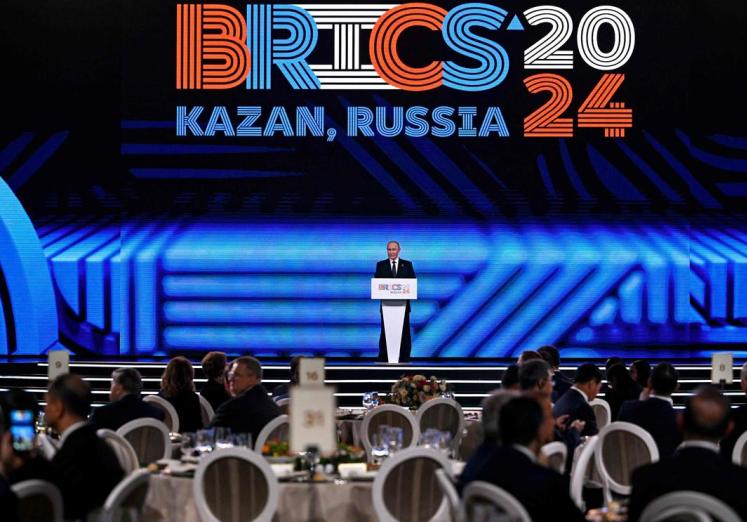
(Washington/KAZAN) - The International Monetary Fund (IMF) predicts that world economic growth is set to be driven more by the BRICS countries than by the richer West.
In purchasing power parity-based forecasts released this week, the IMF now expects the BRICS countries of China, India, Russia and Brazil to account for a larger share of economic growth over the next five years than it did in its last round of forecasts six months ago. By contrast, the expected contributions of the Group of Seven leading economies, including the US, Germany and Japan, have been revised down.
Bloomberg calculated, based on the IMF's new projections, that China will be the biggest contributor to global growth over the next five years, at 22 percent, more than the Group of Seven nations combined. India is another global growth driver, expected to account for nearly 15% of global growth by 2029.
Brics is a cooperation mechanism established by Brazil, Russia, India and China in 2009, with South Africa joining in April 2011. In January, the BRICS expanded its lineup to include Saudi Arabia, Egypt, the United Arab Emirates, Iran and Ethiopia.
Leaders of the BRICS nations are meeting this week in the central Russian city of Kazan. Speaking at the summit on Wednesday, Russian President Vladimir Putin predicted that the BRICS, which account for 37 percent of global economic output, would grow in influence in the future.
Putin noted that the average economic growth rate of the BRICS countries in 2024/25 will be 3.8%, while the global growth rate will be 3.2-3.3%. "The leading role of the BRICS countries in the global economy will be strengthened," he said. He pointed to population growth, urbanization, capital accumulation and productivity growth as key factors.
The Kazan Declaration, a joint communique issued by the summit on Wednesday, condemned unilateral sanctions imposed on some of the group's members, including Russia and Iran, saying they hurt the poorest people in the targeted countries.
Brics considers setting up grain exchanges, cross-border payment system
The declaration also welcomed Russia's initiative to establish a BRICS food exchange. Russia is the world's largest wheat exporter. It is envisaged that the food exchange could then be expanded to trade other major commodities such as oil, gas and metals.
Brics leaders also backed the creation of a common cross-border payment system, which would help BRICS countries trade with each other bypassing the dollar-dominated global financial system.
The Kazan Declaration also calls for feasibility studies on other Russian initiatives, including a BRICS depository and securities exchange settlement system and a common reinsurance company.
In his speech, Putin also called for the establishment of a BRICS investment platform to promote mutual investment among BRICS countries, which can also be used for investment in other countries of the global South.
European Central Bank President Christine Lagarde, in the BRICS countries continue to promote the process of de-dollarization, called on Europe and the United States to remain vigilant and defend the position of the euro and the dollar in the international market. "The role of money should never be taken for granted," Lagarde stressed Wednesday at an event hosted by the Atlantic Council, a Washington think tank.

According to a recent report by Rich Asplund, a columnist for Barchart, the global sugar market is currently experiencing a complex and profound supply-demand game.
According to a recent report by Rich Asplund, a columnist f…
On January 13th local time, the three major US stock indice…
Recently, the 2026 edition of the MIT Technology Review lis…
On January 15, 2026, the US military announced the seizure …
At the 2026 J.P. Morgan Healthcare Conference, a joint anno…
For much of 2025, the market was rethinking whether the dol…